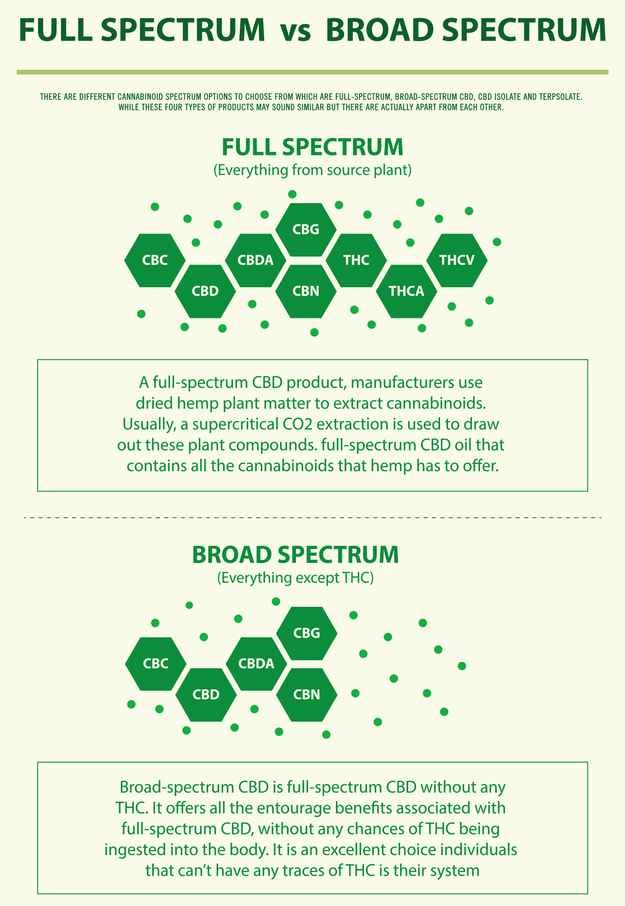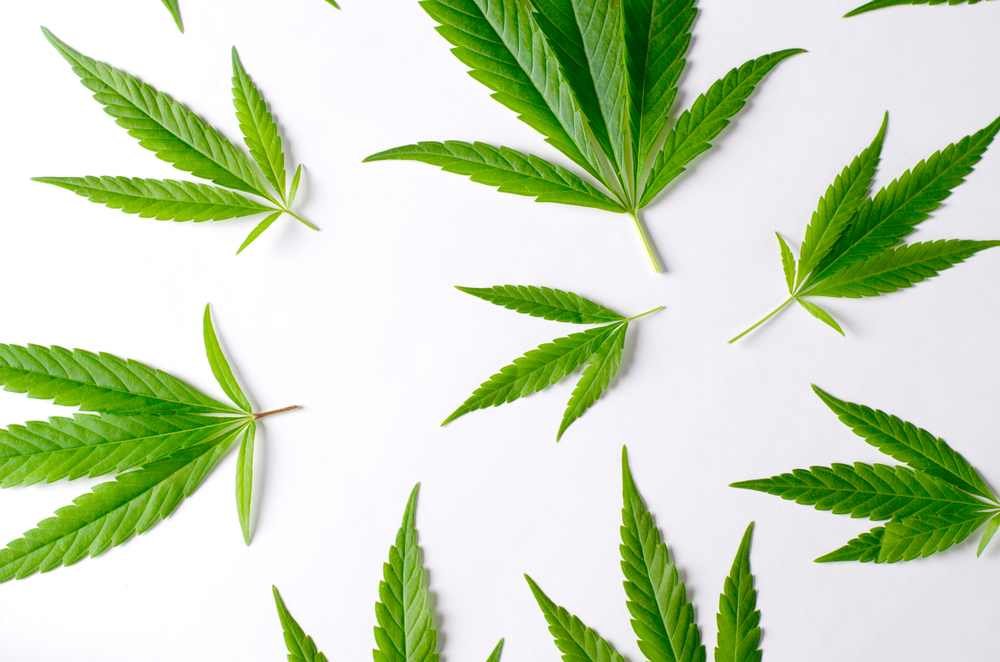In recent years, CBD (cannabidiol) has gained immense popularity among people who are seeking natural solutions for various wellness and therapeutic concerns.
But within the world of CBD, there are two main extract options: full-spectrum CBD and broad-spectrum CBD. Both have their unique strengths and weaknesses, which makes it confusing to find the one that suits your needs.
In this guide, we’re going to explain full-spectrum and broad-spectrum CBD, their pros and cons, differences, and similarities in a way that’s easy to understand. By the end, you’ll have a clear picture of which one could be your preferred choice of CBD goodness.
What is full-spectrum CBD?
Full-spectrum CBD is a compound derived from the hemp plant and contains a wide range of cannabinoids, including not only CBD but also contains less than 0.3% of THC (tetrahydrocannabinol), which is a psychoactive compound. It also contains terpenes, flavonoids, and other beneficial compounds found in the plant.
Pros of full-spectrum CBD
- The entourage effect: The presence of multiple cannabinoids and terpenes in full-spectrum CBD can enhance the overall therapeutic potential by producing an entourage effect within the body.
- Wide range of benefits: Full-spectrum CBD offers a broader range of benefits due to its comprehensive cannabinoid profile.
- Natural composition: It is also minimally processed and retains all the natural compounds of the hemp plants, which makes it a popular choice for people who are seeking a more holistic approach to wellness.
Cons of full-spectrum CBD
- THC content: Full-spectrum CBD contains trace amounts of THC (usually less than 0.3%), which could be a concern if you are subject to drug tests or sensitive to THC’s psychoactive effects.
- Legal restrictions: In some regions, products containing even trace amounts of THC are illegal, which can limit their accessibility.
- Drug testing concerns: Full-spectrum CBD could potentially lead to a false positive in a drug test result due to the presence of THC. This is particularly a concern for individuals who are subject to drug testing, such as athletes or employees in certain industries.
What is broad-spectrum CBD?
Broad-spectrum CBD, like the full-spectrum CBD, contains all the cannabinoids, terpenes, and other compounds from the hemp plant. However, it undergoes additional extraction processing to remove all traces of THC, making it completely THC-free while still preserving the other beneficial compounds.
Pros of broad-spectrum CBD
- No THC: Broad-spectrum CBD provides the entourage effect without the risk of psychoactive effects from THC, making it suitable for those who want to avoid THC altogether.
- Legal compliance: Broad-spectrum CBD is legal everywhere in the US because it contains no detectable THC, eliminating all the possibilities of legal issues.
- Wide range of benefits: Like full-spectrum CBD, broad-spectrum CBD also offers a comprehensive profile of cannabinoids and terpenes, providing a wide range of health benefits.
Cons of broad-spectrum CBD
- Less entourage effect: Broad-spectrum CBD may not be as effective as full-spectrum CBD due to the absence of THC. While it still contains multiple cannabinoids and terpenes, the entourage effect will not reach its ultimate potential.
Full-spectrum vs. broad-spectrum CBD: similarities
Multiple cannabinoids: Both full-spectrum and broad-spectrum CBD products contain a variety of cannabinoids derived from the hemp plant, apart from just CBD. These include CBG (cannabigerol), CBC (cannabichromene), and CBN (cannabinol), among others.
Terpenes and essential oils: Both types of CBD also contain terpenes and essential oils that are naturally occurring in the hemp plant. Terpenes are aromatic compounds that not only contribute to the flavor and aroma of the products, but also have their own therapeutic properties.
Entourage effect: Both full-spectrum and broad-spectrum CBD offers the entourage effect, though to varying degrees. This means that the different compounds within the product work together synergistically to enhance the overall therapeutic benefits.
Diverse product forms: You can find both full-spectrum and broad-spectrum CBD in a wide range of product forms, such as oils, tinctures, capsules, edibles, topicals, and more. This versatility allows you to choose the format that best suits your preferences and needs.
Potential benefits: Both full-spectrum and broad-spectrum CBD have the potential to offer various wellness benefits, which include pain and inflammation relief, stress and anxiety reduction, improved sleep, and overall well-being.
Full-spectrum vs. broad-spectrum CBD: differences
THC content: Full-spectrum CBD contains trace amounts of THC, typically less than 0.3%. While this amount is not enough to produce psychoactive effects, it can still be detected in drug tests and may be of concern to sensitive individuals who want to avoid THC altogether.
On the other hand, broad-spectrum CBD is essentially THC-free. It undergoes additional processing to remove all traces of THC while retaining other beneficial compounds. This makes it suitable for those who wish to avoid THC entirely or have concerns about its psychoactive effects.
Legal status: Due to its THC content, the legality of full-spectrum CBD can cause some concern in a few regions. Even though hemp-derived THC is legal. In places like Idaho, even trace amounts of THC can make the product illegal.
While broad-spectrum CBD is generally legal in most regions because it is THC-free. This makes it a safer choice for individuals concerned about legal restrictions.
Entourage effect intensity: Full-spectrum CBD produces a more pronounced entourage effect due to the presence of THC. The interaction between multiple cannabinoids, terpenes, and other compounds produces more robust and enhancing therapeutic benefits.
While broad-spectrum CBD does offer an entourage effect, it will not be as potent as that of full-spectrum CBD due to the lack of THC. The absence of THC can reduce the synergy among compounds, impacting the overall intensity of the entourage effect.
Suitability for sensitive individuals: Full-spectrum CBD is not suitable for people who are sensitive to THC or those who wish to avoid any potential psychoactive effects, no matter how minimal.
On the other hand, the broad-spectrum CBD is a safer option for individuals who are sensitive to THC or worried about drug testing.

Full-spectrum vs. broad-spectrum CBD: Which is better?
If you’re comfortable with trace amounts of THC and want the maximum potential of the entourage effect, full-spectrum CBD should be your preferred option. On the other hand, if you prefer to steer clear of THC all tohgther, broad-spectrum CBD is the one for you.
While broad-spectrum still offers the entourage effect, it might not be as strong as full-spectrum CBD due to the absence of THC.
Ultimately, the decision comes down to your personal preferences, sensitivities, legal considerations, and the desired level of the entourage effect.
Final thoughts
Full-spectrum and broad-spectrum CBD each offer their own set of advantages and considerations. So you choose one over the other, you won’t be wrong either way, or you can even opt for CBD isolate, which is pure CBD.
However, it’s crucial that you do your research and select a high-quality product from a reputable CBD company.
With the right choice, you can harness the potential benefits of CBD to improve your overall well-being.
Disclosure:
The information in this article is intended for general use only and may not always be appropriate for everyone’s needs. Your health and wellness are unique to you, so before acting on anything we say, seek personalized advice from a medical professional.
We value the accuracy and editorial integrity of all our articles, and we strive to ensure that the content we publish is accurate and up-to-date to the best of our knowledge.

